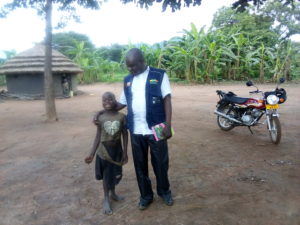
The answer is epilepsy.
Other famous people with the condition include Alexander the Great, Handel, Byron and Gershwin. But that wasn’t much comfort to Peter. Until our community counsellors heard about him, he spent most of his days tied up with rope and locked in his parents’ house in rural Uganda.
Peter’s mother has 11 children, of whom four have epilepsy. Unless Peter was restrained, he would wander about their village; his mother struggled to keep an eye on her son, while doing domestic and agricultural work. Shunned by their community, his family tried witch doctors and traditional healers. They live at least six mile/10 kilometres from the nearest health facility, and public transportation was too expensive for them. Peter’s father admitted that he prayed God would take Peter’s life because the illness was imposing such a burden on their family.
When our community counsellor heard about Peter, she visited the family. Network for Africa’s local partner has trained the counsellor to identify the symptoms of epilepsy, and she brought a health worker to see the family. She also explained to his parents and siblings that Peter was not possessed by evil spirits. After a community education session, run by our counsellors, the village now understands the medical causes of epilepsy, dispelling the myths and misconceptions. Peter and the other three children with epilepsy are now receiving treatment: Peter can talk and go out to play; and he and his siblings are no longer chased away by other children.
Why do so many Africans have epilepsy?
The first recorded incidence of epilepsy was in Mesopotamia four thousand years ago. However, until recently the world has treated the disorder as a curse from the gods. In Uganda, where Network for Africa’s local partners work, people with epilepsy are highly stigmatised. Many communities fear epilepsy is contagious, and children are kept away from school. Young sufferers may not even be allowed to help with the family chores in case they touch food or water, such is the level of superstition. Injuries and worse occur when children having seizures are near open fires or bodies of water, because no one will restrain them for fear of “catching” epilepsy.
In many parts of Africa, a third of the children who survive malaria are prone to epilepsy or other neurological disorders. There are also links with head injuries, trauma at birth and alcoholism. Yet, children who are afflicted are often hidden away and even chained up inside because their families fear the stigma of their society.
But before we wonder at this cruelty, let’s recall that until 1980, people with epilepsy living in Missouri were not allowed to get married – a law shared by 17 other US states until 1956. The first modern treatment for the condition (with phenobarbital) was not until 1912.
In Uganda, we provide counselling support and public health education, including focusing on community leaders, encouraging them to use their role in society to dispel superstition. Tackling the myths surrounding epilepsy is vital in traditional, conservative communities. This is especially important in the Global South, where the majority of the 50 million people with epilepsy live.
Peter’s father now sees he was wasting his time and money on witch doctors. He is grateful to our counsellors and says, “I will do everything possible to support my children’s recovery. We are seeing a great improvement in their condition, especially Peter.”